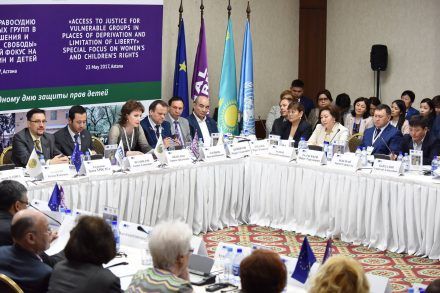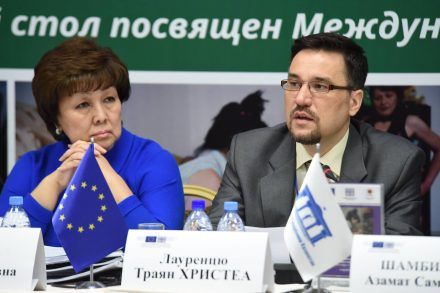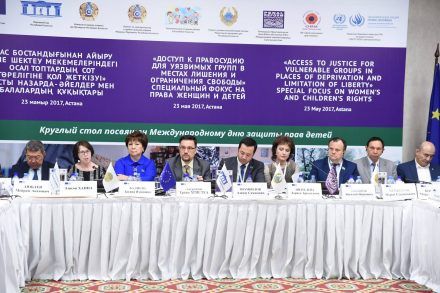PRI hosts roundtable on access to justice for vulnerable groups in Kazakhstan

On May 23 2017, PRI’s Central Asia office (PRI CA), along with the European Union and several national and international organisations, co-hosted a national roundtable, Access to justice for vulnerable groups in places of deprivation and limitation of liberty: special focus on women and children’s rights, in Astana, Kazakhstan. The roundtable, which was dedicated to International Children’s Day (June 1), sits within the framework of a project implemented by PRI CA and funded by the Delegation of the European Union to Kazakhstan. The project aims to support judicial reform in the country by empowering civil society organisations to improve access to justice for vulnerable groups.
PRI’s Executive Director Alison Hannah attended the meeting, as did Traian Hristea, Head of the EU Delegation to Kazakhstan. Parliamentarians, judges from seven regions of Kazakhstan, international experts from the United Kingdom and France, representatives of civil society and the scientific community, and representatives of international organisations and diplomatic missions in Kazakhstan also took part.

Head of the EU Delegation to Kazakhstan, Traian Hristea
In his welcoming remarks, Traian Hristea stated that ‘The European Union emphasises the right of equal access to justice for all, including members of vulnerable groups, and the importance of awareness-raising concerning legal rights. States should ensure the provision of legal aid to all persons regardless of age, race, colour, gender, language, religion or belief, political or other opinion, national or social origin or property, citizenship or domicile, birth, education or social status or other status.’
An analysis on access to justice for vulnerable prisoners in Kazakhstan was presented at the roundtable, as well as issues relating to the protection of the rights and interests of women and children in conflict with the law. Any person in custody may be at risk of becoming a victim of ill-treatment by staff or other prisoners. However, discrimination and prejudices exacerbated in places of detention make some groups, such as women and children, particularly vulnerable.

PRI’s Alison Hannah speaking at the roundtable
PRI’s Executive Director Alison Hannah said: ‘We are particularly grateful for the financial support from the EU that has made our work on vulnerable groups in detention possible. We are also extremely grateful for the support received from the Ministry of Interior and other government departments and officials of the Republic of Kazakhstan who have achieved a great deal over the past few years in reforming the penal system in line with international standards of good practice. Today’s roundtable is an excellent opportunity to share information and expertise, and to explore some of the complexities within these groups of vulnerable prisoners.’
Azamat Shambilov, PRI CA’s Regional Director, explains that, ‘Within the framework of the project on vulnerable prisoners, carried out by PRI with the support of the European Union, divergent and restorative justice programmes will be implemented to reduce the number of children coming into contact with the law.’
Read PRI CA’s press release on the roundtable in Kazakh and Russian.
More Information
Read more about PRI’s work on vulnerable groups. Take a look at our toolbox on the Bangkok Rules, the United Nations Rules for the Treatment of Women Prisoners and Non-custodial Measures for Women Offenders, which were adopted by the UN General Assembly in December 2010.